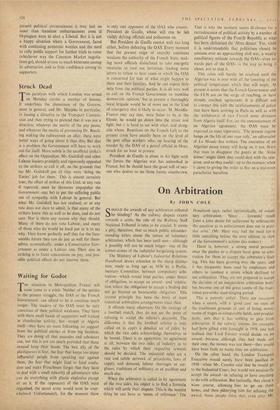Waiting for Godot
THE situation in Metropolitan France will I soon come to a crisis. Neither of the parties to the present struggle, the OAS or the French Government, can afford to let it continue much longer. The leaders of the OAS must be very conscious of their political weakness. They have with them small bands of supporters well trained in clandestine activity, but—except in Algeria itself--they have no mass following, no support from the political parties or from big business. They are doing all that assassins and saboteurs can, but this is not too much provided that those around keep their heads. The best ally of the plastigneurs is fear, the fear that keeps too many influential people from 'speaking out against them, the fear that might lead to fatal confu- sion and make Frenchmen forget that they have to deal with a small minority of adventurers who can do everything with plastic explosive except sit on it. If -the opponents of the OAS were organised, the secret army would soon be over- whelmed. Unfortunately, for the moment there is only one opponent of the OAS who counts: President de Gaulle, whose will can be felt visibly driving officials and policemen on.
But President de Gaulle cannot wait too long either, before defeating the OAS. Every moment that the present reign of anarchy continues weakens the authority of the French State, mak- ing more officials disinclined to take energetic measures to root out terrorism, leading more jurors to refuse to hear cases in which the OAS is concerned for fear of what might happen to them and their families. And he can expect little help from the political parties. It is all very well to call .On the French Government to 'mobilise democratic opinion,' but at present a thoroughly loyal brigade would be of more use in the kind of emergency that is likely to occur. M. Mendes- France may say that, were Salan to be at the Elysde, he would go down into the street and fight, but it is hard to see with what. and along- side whom. Reactions on the French Left to the present crisis have usually been on the level of the poSt office workers who, on hearing of the murder by the OAS of a postal official in Oran, struck for an hour in protest. • • President de Gaulle is alone in his fight with the forces the Algerian war has unleashed in France, but he should have the good will of any- one who desires to see those forces overthrown. That is why the moment seems ill-chosen fo:. recrudescence of political activity by a number of political figures of the Fourth Republic at what has been christened the 'Alma dinner.' For, while it is understandable that politicians should anxious over an approaching civil war, a weakly conciliatory attitude towards the OAS,---even wards part of the OAS---is the way to bring it about, not to stop it.
This crisis will hardly be resolved until the Algerian war is over with all the lowering of the political temperature which that will imply. At present it seems that the French Government and the FLN are on the verge of reaching. or have already reached, agreement. It is difficult not to connect this with the reinforcements of police that have been arriving in Paris as well as with the withdrawal of two French army divisions from Algeria itself. For, on the announcement of an Algerian agreement, the OAS must be , expected to react vigorously. 'The present regime hangs on the life of one man only,' an editorialist of La Monde has written. The execution of an Algerian peace treaty will hang on it too. Were that man to disappear the guests at the 'Alma dinner' might think they could deal with the sitti- ation, and so they could-- up to the moment when it came to giving the order to fire on a mutinous parachutist battalion.


































 Previous page
Previous page